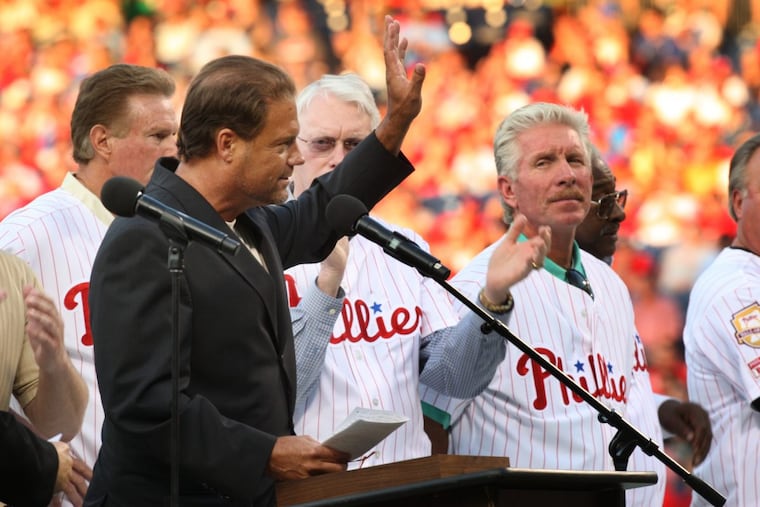Darren Daulton learned from life's lessons, but Pete Rose flunked
Unlike Pete Rose, Darren Daulton turned his life around after time spent as a rambunctious ballplayer.

The Phillies' on-field struggles were overshadowed recently by the shocking news of Darren Daulton's death from brain cancer and allegations that Pete Rose had a sexual relationship with a 15-year-old girl when he played for the Cincinnati Reds.
Both cases remind us about the precariousness of life and how some of our onetime heroes chose to live theirs.
Like a number of professional athletes, Daulton and Rose were self-absorbed men who squandered the prime of their lives with reckless behavior and wayward pleasures. But there is a major difference between the two: Daulton learned from his mistakes. Rose never did.
Both former Phillies are indelibly etched into the collective memory of this city for their gutsy performances on the diamond. Daulton, affectionately known to fans as "Dutch," was a hard-edged catcher who overcame a career-threatening knee injury to become a three-time All-Star.
He was both physically and mentally tough, a man's man. Daulton made teammates accountable and, in 1993, provided uncontested leadership for a colorful and irreverent band of throwbacks who went from worst to first in the National League East and restored some respectability to a franchise that had become a perennial loser.
Similarly, Rose was the catalyst for the 1980 Phillies. He was not a naturally gifted ballplayer, but he knew how to win. Popularly known as "Charlie Hustle," he played with a fire that burned white-hot during his five years in Philadelphia. His cockiness and blue-collar approach to the game endeared him to the hometown fans. The example inspired a highly talented nucleus of younger stars to realize their full potential and capture that once-elusive world championship.
Unfortunately, there was another, less attractive side to Charlie Hustle. We know now that he bet on the game when he managed the Reds in the late 1980s, violating the cardinal rule of baseball. After he was banned from the game in 1989 by then-Commissioner Bart Giamatti, Rose's life spiraled out of control.
Charlie Hustle spent his time hocking memorabilia, trading on his name to pay off considerable gambling debts, and serving a prison sentence for tax evasion. For more than a decade, Rose repeatedly lied about betting on baseball in the futile hope of being reinstated so he could become eligible for the Hall of Fame.
Last week, allegations surfaced that Rose, while playing for the Reds in the 1970s, maintained a sexual relationship with a girl who was not yet 16. The allegations led the Phillies to cancel their ceremony to induct Rose into the team's Wall of Fame that had been scheduled for Saturday night.
It was the final straw for many of Rose's former teammates and fans, as well as writers, including this one. We've all run out of patience with him. He has damaged his credibility so severely that he will never be trusted again.
I feel bad for Pete Rose, now 76. Not because he destroyed his chance for a bronze plaque in Cooperstown, but because he's flunking life. He has used baseball, as he has used us, for nothing more than feeding his own ego. But I feel worse for Daulton.
To be sure, Daulton, 55, was certainly not a choirboy during his playing days. Daulton's chiseled physique and impressive power-hitting raised questions about the possibility of steroid use. His movie-star good looks made him the object of desire for many of the women with whom he partied, resulting in two divorces.
After his career ended in 1997, Daulton was a troubled, unsettled soul. He struggled with alcohol, was estranged from his four children, and stirred controversy with remarks about metaphysics, occultism, and the end of the world. But Daulton learned from hardship and changed his ways.
In 2007, Comcast Sports Network brought him back to Philadelphia as a baseball analyst. Daulton found personal happiness in a new relationship with his current wife and as a pitchman for Yuengling Beer. His community service activities, public appearances and friendly disposition made him one of the most beloved former athletes in the city.
By 2013, when he was diagnosed with glioblastoma, Dutch had turned his life around. He not only acknowledged his shortcomings, but had made up for them.
"Anything I did in the past is my fault," he acknowledged. "Not my ex-wives' fault, not any of my kids' faults, not baseball, not the media. I did the damage, but I've also learned from it."
That kind of humility is rare among pro athletes. The ability to reform one's life is rarer still. It's why the recurrence of his brain cancer was so tragic.
William Kashatus is author of "Macho Row: The 1993 Phillies and Baseball's Unwritten Code" (University Press of Nebraska). Email him at bill@historylive.net